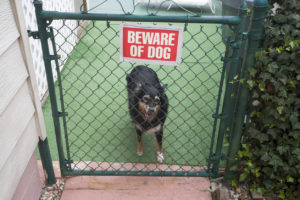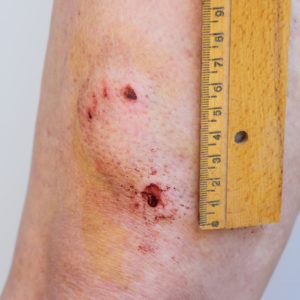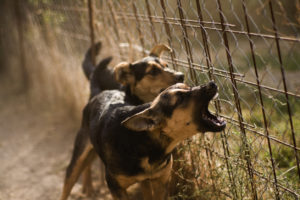Key Points:
- If you have been attacked by a dog, the dog’s owner may be held liable for your injuries.
- The at-fault party’s homeowner’s insurance, renter’s insurance, or even business policy may offer coverage for your dog bite injury claim.
- To establish a dog owner’s liability in a dog bite case, the dog must have a provable history of aggression, or the dog owner must have negligently handled the dog.
- If your case is successful, you may be eligible to receive compensation for medical bills, lost income, physical pain and suffering, mental distress, scarring and disfigurement.
So, you or a family member has been seriously injured by a dog bite in Atlanta or elsewhere in Georgia. Your first instinct might have been to chalk it up to bad luck and try to move on. After all, you can’t sue a dog, right? Don’t give up hope. In many cases, homeowner’s insurance, renter’s insurance or even a business policy may offer coverage for your dog bite injury claim.
The question of coverage often turns on whether or not the owner or keeper of the dog has liability insurance. Virtually all homeowner’s policies in Georgia carry something called “Liability Protection”. The policy limits can range from $100,000 to as much as $500,000 or more depending on the assets and interests of the homeowner. Some (although, unfortunately few) renters have insurance that covers dog bites. Also, certain businesses that own or keep dogs may have coverage under a business insurance policy.
Liability Insurance is the coverage that comes into play when someone hurts themselves while they are (legally) on your property, such as slipping and falling or encountering a known hazard on your land that you did not warn them about, like a deep pit you have not yet filled in. This sort of policy defends and indemnifies (covers or reimburses) the negligent person or business against a claim or judgment. This coverage usually also extends to bites inflicted by the dog.
However, even if there is a potential insurance policy, some things must still be proven in order for the bite or attack to qualify as a covered loss.
Georgia Dog Bite Laws: Establishing Grounds For The Dog Owner’s Liability
Under Georgia law, there are at least two general ways to hold a dog owner liable for your injuries. Either the dog has a provable history of aggression, or the dog owner acted with negligence in handling the dog. Let us fully unpack these two concepts for clarification.
1. History of Aggression
Under Georgia law, O.C.G.A. § 51-2-7, and indeed in most other states, there is an aggressive dog standard, commonly referred to as the “One Bite Rule.” Although strictly speaking “one (previous) bite” is not required, the Rule is an interpretation of the statute which maintains that a dog owner should not be held responsible for injuries caused by their animal if the owner was truly unaware that the dog might behave that way. After all, no one knows for sure what a dog is capable of until something happens.
Proving that a dog owner actually knew, or should have known, that their dog was aggressive or dangerous can be as easy as discovering prior animal control reports regarding that animal. There may also be statements or testimony from surrounding neighbors who have had experiences with the dog at issue. Some neighbors are eager to tell their story when it involves a dangerous animal in the area.
Judges in Georgia have even established that if a dog is known “lunge” at people or aggressively chase or threaten people, even while restrained, this can be enough to inform the owner of the dog’s vicious propensity, noting that it is essentially just an attempted, but unsuccessful, bite. This would be enough to put the dog owner on notice in the eyes of the law, and any future “successful” bites would not be protected under the “One Bite Rule”.
2. Negligent Handling
If there is no evidence of previous aggressive behavior from the dog, there still may liability on the part of the dog owner. If they managed the dog carelessly or let it wander free in violation of local ordinances, known as leash laws, they can still be held responsible for any injury it may cause.
For instance, under Fulton County Ordinance Article VI Division 1, Sec. 34-205, a dog may not leave the owner’s premises unless it is fully retrained on a leash. Most cities and towns in Georgia have such an ordinance on the books.
When a dog “digs out” or jumps the fence, this too can be considered negligent handling by the dog owner. It is the owner or keeper’s responsibility to ensure that the animal is restricted to owned property when not on a leash.
When a dog owner violates this law and allows the dog to run free, he or she can be held liable for any injury the dog may cause, even if the dog had no previous indications of viciousness.
We will research local ordinances and public records. We can also gather witness statements and visual evidence to prove the dog owner’s liability. As our attorneys collect evidence to prove your claim, we also will focus on evidence that may be useful in disproving the dog owner’s version of the attack.
Provocation: The Disqualifier
We do caution that to win a dog bite claim or case, the attack must be unprovoked by the victim. The statute states this in O.C.G.A. § 51-2-7.
There are obvious behaviors that are considered provocation such as striking the animal or otherwise trying to harm it. However, attempting to pet or play with, or put your face into the face of an unknown dog can sometimes be considered provocation and provide a defense to the dog’s owner. In any case we recommend that you be very careful if you encounter an unknown or unaccompanied animal in public.
Determining The Amount of Compensation for Your Dog Bite Injuries
As a dog bite victim, you may be able to recover several kinds of damages. You may be eligible to receive payment to cover your medical bills, lost income, physical pain and suffering, mental distress, scarring and disfigurement. A dog bite, no matter how severe, is always traumatic, and the victim is never quite the same.
In some cases, you may have a right to seek punitive damages. These may arise if the dog owner acted with flagrant disregard for the safety of others in controlling the dog. In cases where the victim was a child or the attack was particularly severe or prolonged, the Court may add monetary damages intended to punish the owner for the unacceptable behavior.
Evidence used to show how the dog bite occurred can also be used to establish how much you should recover especially where there are “aggravating” factors like the ones listed above. An experienced attorney will often work with highly qualified experts to analyze this evidence and arrive at a dollar figure to fairly compensate you for your losses, your injuries and your pain and emotional distress.
Dog bites often leave permanent scars. Puncture wounds, tears and abrasions can linger for months or years. If these are on a visible and obvious part of the victim’s body, it can mean additional compensation. Medical experts can help establish a suitable value for this component of your claim.

 1201 West Peachtree Street #2339 Atlanta, GA 30309+1-770-212-3795$0-$100000
1201 West Peachtree Street #2339 Atlanta, GA 30309+1-770-212-3795$0-$100000Thank you for believing on the community and believing in education. Thank you for responding to communication and helping in all the ways that you can.













